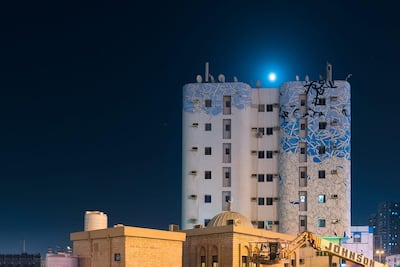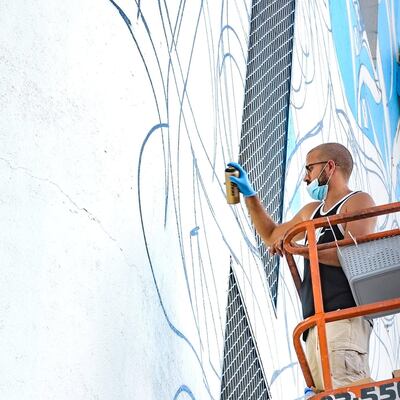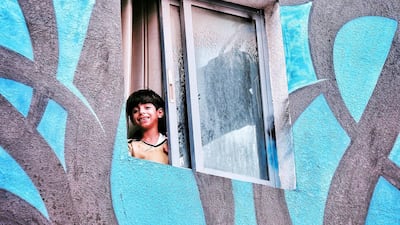The artist eL Seed describes two women who sat outside their homes, separated by a street, facing his staggered mural in Cairo.
Though they were sisters, they were no longer on speaking terms. But little by little, he explains, they moved their chairs closer together, until one day, they were talking again.
“One guy in the neighbourhood said to me,” eL Seed recounts. “Your project is a project of peace.” It brought people together.” He pauses and clarifies: “It’s not the art piece that brings people together, it’s the experience that you create around the art piece that brings people together.”
eL Seed, who is based in Dubai, has become well-known for his expressive calligraphic forms, spray-painted in cities across the globe and in areas – like the DMZ border between South and North Korea – that are potential conflict zones. His work is a kind of hybrid between street art and classical Arabic calligraphy: fat, angular letters outlined in bright red or blue, executed directly on buildings.
His first Abu Dhabi piece
He is now collaborating with 20 schoolchildren in Abu Dhabi to produce the capital’s first mural, stretched across the wall of the Abu Dhabi Municipality Building, near Abu Dhabi Mall. Over the next three Saturdays – February 24, March 3, and March 10 – he and the children will be at work painting verses from a poem about the “Mother of Our Nation,” written by Sheikh Mohammed bin Rashid.
The project launches “The Art Movement” by the Abu Dhabi-based Fatima bint Hazza Cultural Foundation, which is involved in bringing literacy and education to children in the Emirates. It has produced over 150 books – in Arabic, English, and in Braille versions – and wrestles directly with the question of how to reach children in a fast-changing environment of new technology, when children are as likely to reach for an iPad as for a bound paper tome. The foundation, for example, has also produced 40 educational apps that are available free from the App Store.

In these conditions, Maysoon Barber, executive director of the Foundation says, they decided to wow children – to stop and startle them with the presence of art. “We aren’t seeking conventional ways,” she says. “We want to integrate art into their lives using huge canvases – the size of an entire building.”
eL Seed’s project is the first commission in the foundation’s new program, which will involve future collaborations in future.

The children selected to participate – aged 8 to 13 years old – reflect the geographical diversity of Abu Dhabi: they are drawn from the American International School in Abu Dhabi; the eight schools that comprise the National Schools of the Emirates; and the Rosary School. The students will also take photography and videography courses, and a module on journalism that will track and analyse the reception of the mural.
For the wider public, there is the chance to watch the work-in-progress, with entertainment, food trucks, and art activities set up near the Abu Dhabi Municipality Building during the three days that eL Seed will work on the mural.
'I'm here to give to the community'
Social responsibility is a key part of eL Seed’s work. “I’m not here to create something aesthetically beautiful,” he says. “I’m here to give to the community and to inspire.”
His process of arriving at Arabic calligraphy also reflects his own nuanced cultural position.
He was born in Tunisia and grew up in France, and didn’t learn to speak and read Arabic until he was 18. “I played with the letters,” he recalls, “And, without knowing it, developed my own style.”
I asked him why he taught himself Arabic at the late age of 18.
“It’s a question of identity. I didn’t feel French in France, and I didn’t feel Tunisian in Tunisia,” he explains. “I looked at myself in the mirror and I thought, I look like someone called Mohammed, not like someone called Jean Paul.”
“The funny thing is Arabic calligraphy made me accept my French identity,” he says. “Now I say I’m French. But if you asked me 20 years ago, I would never say I’m French. The more I was digging into my Arabic roots, the more I realised I would never be able to do what I am doing today if I wasn’t French at all. Now, I feel fully both. I feel fully French. Fully Tunisian. The world make you feel that you have to choose sometimes, but you don’t choose between your mom and your dad. I’m French-Tunisian, Tunisian-French.”
“But I don’t define myself by nationality," he continues. "Identity is deeper than just a territory. It’s more about what I’ve done, where I come from, in terms of place, neighbourhood, where I want to go, where I went, my dream. This is how I define myself. This is my identity.”
eL Seed's mural will be painted on the Abu Dhabi Municipality Building on February 24, March 3, and March 10 2018, with food and entertainment from 11am to 8pm near Gate 1.


